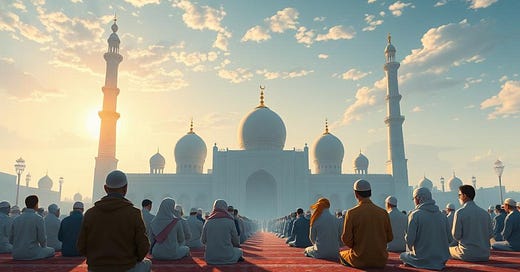Assalamu'alaikum wr wb my dear friend!
Eid Mubarak to you! Taqabbalallahu minna wa minkum. May Allah accept our good deeds. Ameen.
Here are 2 Ideas, A Verse to Reflect Upon & One Question for you 👇
Two Ideas from me
1. Syawal reflects on our Ramadan
As we enter Syawal, we are happy and joyous over a month of fasting, devotion and seeking Allah’s Mercy hoping to have earned His Forgiveness.
At the same time, our state of seeking Allah’s forgiveness shouldn’t change just because Ramadan has left.
Remember my friend, some signs of a successful Ramadan is that we are more conscious of Allah, and that we continue to seek His forgiveness and remain consistent in our deeds.
Three things we can look out for:
Are we more conscious of the words that we speak? Because what we speak reflects a lot about our heart and state of mind.
Are we consistent in our actions when we are in public vs private? Because it shows our taqwa and sincerity. Whether we truly believe in Allah and that He is All-Seeing, All-Hearing.
Are we busied in ourselves daily for the sake of Allah and His Messenger ﷺ? Or are we busying ourselves for the pursuit of a temporary dunya?
These three things are essentially for, or against, our iman.
Iman(faith) comprises of having a strong belief and conviction in the heart, verbal declaration of shahada and physical righteous actions like prayer, charity and fasting.
2. Can’t do it all, don’t lose it all.
We did more acts of worship in Ramadan. The blessed month of Ramadan facilitates so much more good deeds. Suddenly we could fast for 30 days consecutively and go to the mosque every night or so, whereas on normal months, the thought of fasting may not even cross our minds…
Let’s strive to make it a point to continue some of the good habits that we have built. It could be praying Witr prayers (even if its just 1 rakaat), fasting just on the White Days of each Islamic month (13,14,15), reading a few verses of Quran each day or memorising a new surah or/and dua every month.
The idea is to form new habits even if it is the smallest ibadah. Focus on incorporating the voluntary deeds that you can feel the sweetness of doing them. That brings you closeness to Allah.
Remember, Allah loves the deeds which are done consistently, even if they are small. (Sahih Bukhari 6464)
A Verse to Reflect Upon
Inform My servants that I am the Most Forgiving, the Most Merciful.
And that My punishment is the most painful punishment.
Surah Al-Hijr 15:49-50
These verses one after another, speak two truths about Allah. But sometimes as humans we might wonder: Why would God being Most Merciful, also have the most painful punishment?
The answer lies in His Justice and Wisdom, He is also The Most Just (Al-Muqsit or Al-Adl) and The Most Wise (Al-Hakim). His Mercy is vast and offered to every one of us, regardless of our past sins and mistakes, but that does not erase accountability.
If there were no consequences for wrongdoing, then what would stop oppression, arrogance and ignorance?
Just as how a kind teacher still disciplines students for their mistakes, Allah upholds His Law.
Imagine if there were no consequences for doing wrong things, is that actually being merciful?
So balance our hope for Allah’s Mercy with the fear of Allah’s punishment.
Allah’s Mercy is always open to those who seek it, and His justice awaits those who ignore it.
One Question for you
Does it feel burdensome or rewarding when you add on voluntary ibadah for the sake of Allah?
Write down a target of what you want to achieve in the month of Syawal!
Recent Reads
For any feedback and comments, drop us an email at digest@hourofqadr.com






